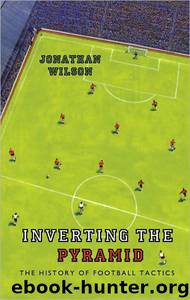Inverting the Pyramid by Jonathan Wilson

Author:Jonathan Wilson [Wilson, Jonathan]
Language: eng
Format: epub
Tags: Non-Fiction, History, (¯`'•.¸//(*_*)\\¸.•'´¯)
ISBN: 9781409102045
Amazon: 1409102041
Goodreads: 3621358
Publisher: Orion
Published: 2008-09-01T00:00:00+00:00
That gave the left-back, Giacinto Facchetti, who had arrived at the club as a forward, greater licence to push forwards, because the man he was marking tended to sit deeper. ‘Jair was in front of Burgnich,’ Maradei went on. ‘He was not a great defender, but dropped deep because he was the kind of player who liked to run at people and needed space in front of him. On the left, in front of Facchetti, you had Corso, a very creative player, not the quickest or the most attacking, but a man capable of unlocking opposing defences. He was the link man with the front guys. Carlo Tagnin and, later, Gianfranco Bedin, sat in front of the defence and did most of the running and defending. Alongside him was Suárez who had great vision and the ability to hit very accurate long passes. That was the typical way Inter restarted after winning possession. They would either get the ball to Jair, who would run into space, or leave it for Suárez, who would hit it from deep over the midfield for Mazzola or the centre-forward - Beniamino Di Giacomo or Aurelio Milani, neither of whom was particularly gifted - or Jair cutting in from the right to run on to.’
Facchetti was the key, and it was he who gave Herrera his best defence against the accusations of negativity. ‘I invented catenaccio,’ Herrera said. ‘The problem is that most of the ones who copied me copied me wrongly. They forgot to include the attacking principles that my catenaccio included. I had Picchi as sweeper, yes, but I also had Facchetti, the first full-back to score as many goals as a forward.’ That is a slight exaggeration - Faccchetti only once got into double figures in the league - but his thrusts down the left give the lie to those who suggest Herrera habitually set up his team with a libero and four defensive markers.
The effectiveness of Herrera’s system could hardly be questioned. They won Serie A in 1963, 1965 and 1966 - missing out in 1964 only after losing a playoff to Bologna, were European champions in 1964 and 1965 and reached the final again in 1967. Success alone, though, does not explain why Shankly so hated Herrera and catenaccio, even allowing for their perceived defensiveness. The problem was the skulduggery that went along with it.
Even at Barcelona there had been dark rumours. Local journalists who felt aggrieved by Herrera’s abrasive manner began referring to him as ‘the pharmacy cup coach’ and, although players of the time deny the allegations, they are given credence by what followed. ‘He was serious at his job, but had a good sense of humour, and knew how to get the best out of his players,’ said the Spain midfielder Fusté, who came through Barcelona’s youth ranks during Herrera’s reign. ‘All that stuff about him giving us all drugs is all lies. What he was, was a good psychologist.’
That he certainly was, but the suggestion he was also a decent pharmacologist never went away.
Download
This site does not store any files on its server. We only index and link to content provided by other sites. Please contact the content providers to delete copyright contents if any and email us, we'll remove relevant links or contents immediately.
The Inner Game of Tennis by W. Timothy Gallwey(3687)
Unstoppable by Maria Sharapova(3524)
Crazy Is My Superpower by A.J. Mendez Brooks(3400)
Urban Outlaw by Magnus Walker(3395)
Mind Fuck by Manna Francis(3194)
The Social Psychology of Inequality by Unknown(3031)
The Fight by Norman Mailer(2940)
Unstoppable: My Life So Far by Maria Sharapova(2502)
Accepted by Pat Patterson(2371)
Going Long by Editors of Runner's World(2362)
Futebol by Alex Bellos(2359)
Backpacker the Complete Guide to Backpacking by Backpacker Magazine(2248)
Sea Survival Handbook by Keith Colwell(2242)
Motorcycle Man by Kristen Ashley(2238)
The Happy Runner by David Roche(2238)
The Sports Gene: Inside the Science of Extraordinary Athletic Performance by David Epstein(2177)
Peak: Secrets from the New Science of Expertise by Anders Ericsson & Robert Pool(2033)
Endure by Alex Hutchinson(2028)
The Call of Everest by Conrad Anker(1909)
